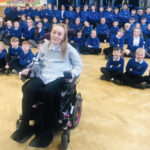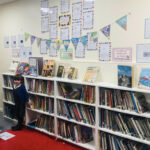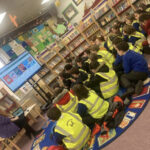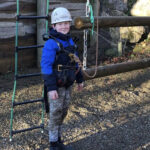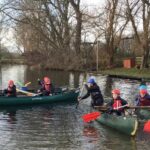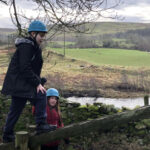Learning Outdoors
 Forest school vision:
Forest school vision:
Our children take part in forest school sessions each week that start with a ‘spark’, a game or activity linked to a theme, skill or an identified area of the curriculum. The children then explore in their own self-initiated activities, develop skills such as tool use and finally come together at the end of each session to share a campfire snack and reflect on what they have experienced, achieved, tried or improved.
The first sessions for children new to forest school focus on establishing boundaries and routines and developing an environment of trust. Children come together to explore, communicate and work together. How the children respond to the sessions influences future sessions as they follow their interests and ideas and take ownership of what happens. Teachers identify key skills to focus on with individuals, groups or the class and guide children to develop these. The prime aim of forest school is to develop skills of metacognition, emotional wellbeing and communication and language, but class teachers will identify areas of the curriculum that link to the activities.
| Forest Schools
Autumn 1 |
Forest Schools
Autumn 2 |
| Reception
Year 1 Year 3
|
Reception
Year 2 Year 6
|
Eco-school vision:
Classes take part in planned activities that are linked to the Eco-Schools criteria, enhance identified areas of the curriculum or linked to special environmental projects, both national and school-based. The aim of each session is to encourage children to take ownership of the school grounds and become aware of their responsibilities to care for the environment in their locality and nationally.
The sessions are project-based linked to the areas outlined in the Eco School criteria. The projects are planned in line with changing seasons and national events such as Keep Britain tidy litter picks and RSPB bird counts. Links to the National Curriculum for science, geography and DT are also used to design the projects and lessons.
The children build on their experiences term by term and learn about how projects and outcomes develop over time; for example they sow seeds, watch them grow and harvest the vegetables. Class teachers are able to carry on the projects in class or link them to other areas of the curriculum. Recycling paper in class, turning lights of, watering plants and picking up litter will become part of the daily routine in school and ‘what we do’.
Yearly Overview for Eco Schools
|
Autumn term Years 1 and 2 & Years 5 and 6 |
|
Autumn 1
|
Autumn 2
|
| Project: Improve Our grounds –how can our garden grow? Click here | |
|
Spring term Years 1 and 2 & Years 3 and 4 |
|
Spring 1
|
Spring 2
|
|
Summer term Years 1 and 2 & Years 4 and 6 |
Summer
|



